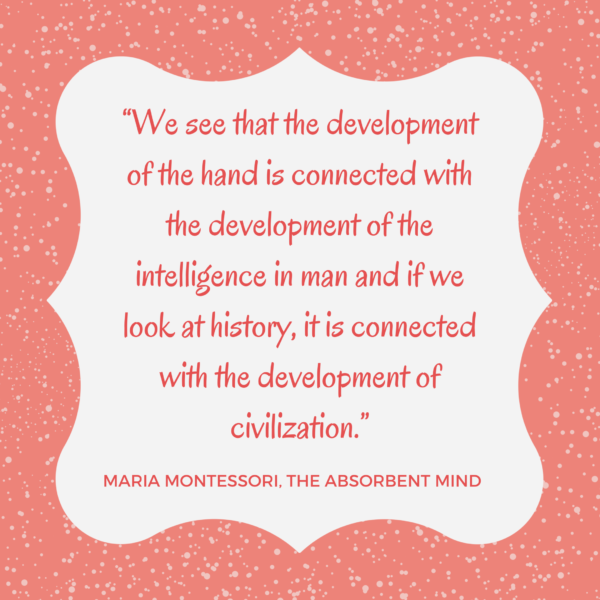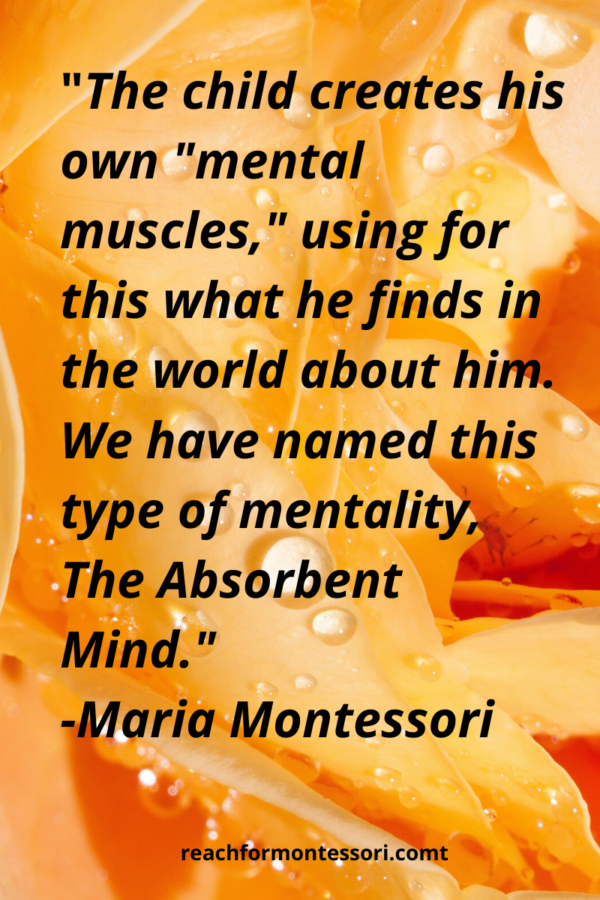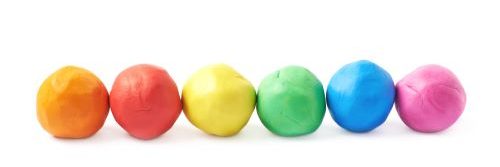The absorbent mind
The absorbent mind describes a child's ability to take in information through their environment and their experiences by using their own “mental muscles” This ability begins from the moment of birth and lasts till the age of about six.
This occurs in the first plane of development and is divided into two subcategories. From ages 0-3, a child is considered an unconscious absorber. From the ages 3-6, the child absorbs information in a conscious manner.
Parents hear the phrase and often interpret it to mean that they should take advantage of this period of rapid brain development and teach their child everything the parent knows, or even worse, everything under the sun.

Piaget wrote that “children are not empty vessels to be filled with knowledge“. Dr. Montessori agreed.
Children are explorers and researchers. They are able to formulate their own ideas about how the world works.
Young children aren't small adults. So, drill all the knowledge into them as you may, they aren't capable of thinking like we do.
So, you will likely be wasting their time and your own with these rote facts. This will serve no purpose but to prevent them from being able to master their own comprehension of their world.
This article isn't an admonishment of parents in any way. We all do what we think is best for our kids.
Rather, this is an invitation to open minds to the idea that young children don't need to be taught as much as we think they do! My favorite Magda Gerber quote is, “Be careful what you teach. It might interfere with what they are learning.”
Enough on Piaget and Gerber, though. Let's move onto Dr. Montessori and her ideas on the absorbent mind!

Maria Montessori and the unconcious absorbent mind
Dr. Montessori noted in her book by the same name that a newborn progresses from being able to do essentially nothing but flail their limbs, to crawling, then walking and talking. None of this needs to be taught to a baby; they simply achieve these milestone with the passing of time and taking in what they hear.
This opens the idea to the concept that children doesn't owe their development to their parents. It's the child who develops into the adult.
A child's ability to absorb language
Take the acquisition of language as another example. It isn't parents who teach their kids how to speak. Kids learn how to talk by taking language in themselves.
Imagine if we had to teach our children the name of every object around them, how to use pronouns, and form sentences. We would be in their faces teaching them all day, every day!
But we don't, do we?
Language is something that children absorb. This is why dual-language households don't have one parent interpreting for the other.
A personal example I'd like to share is from my daughter's Spanish emersion program at her school. We are not a bilingual household and I wondered how she was coming home from school, after just two months, reading and singing in Spanish.
It turns out she her teacher sings and speaks Spanish throughout the day. He doesn't explain the meaning of the words, but the kids, with their absorbent minds use the context within the music and instructions to figure it out on their own.
I'm in amazement of these children! And this is yet another example that children don't need to be taught everything…they have the natural ability to absorb through their environment and experiences.
The prepared environment, sensorial materials, and their contribution to the conscious absorbent mind

This is where I want to talk about how we can foster the absorbent mind.
If you are at all familiar with Montessori materials and how Montessori classrooms and homeschooling areas are set up, you have noticed certain things. The first being every material has a sensorial aspect to it. The sense of touch being the foremost.
Children must use their hands to utilize these materials. The built in control of error allows children to learn through their other senses, as well. Open-ended toys are a help, too!
The following are some examples of Montessori materials. Read more about them and you will see what I'm talking about.
- Sandpaper Letters
- Button Frames
- The Small Movable Alphabet
- Long Red Rods
- Knobbed Cylinders
- Land and Water Formations
These examples are just a taste of the contribution of Montessori materials during the 3-6 stage of conscious absorption.
Something else you'll notice about a Montessori learning area is the way it is meticulously prepared. The preparation of the environment is so that a child can explore the materials independently.
This allows a child to choose activities of their own interest and at their own pace, without interference. A child may choose to paint, wash a table, and work with any material they choose.
This freedom of choice lends itself to the development of self-discipline.
Along with this prepared environment, you'll notice children have the freedom of movement, which any parent knows is a must for young children. Even the handling of the materials themselves requires a great deal of movement, which lends itself to furthering of the absorbent mind.
One example of this is the Montessori Long Red Rods. Though they are worked with on a rug, a child must carry each rod to the rug individually with one hand at each end of every rod.
This gives the child a change to experience each rod's length and weight.
A prepared environment is a calm and orderly place for children to take in information on their own terms!
How to answer a child's many questions during this phase
As any parent of a child under six knows, “why” questions are pretty popular with this age group. Kids ask why the sky is blue, why the grass is green, why do birds fly, ect. The questions seem never ending!
All these questions, as annoying as they can sometime be, show display the child's curiosity and their desire to learn!

Sometimes we believe they want to know the intricate details of these things by these questions; and they might. But a child's ability to comprehend why grass is green isn't fully developed at this age. (I'm referring to neurotypical children. Kids who fall on the “gifted spectrum” tend to have advanced comprehension skills.)
So, how can we answer all of these “why” questions without making the mistake of pouring our own knowledge into them and interfering with their natural curiosity?
When your child asks you why grass is green, there is no benefit into going into plant biology. Not only will this likely bore your child, there are some concepts a young child simply can't understand.
Using this question as an example, you can give an explanation like this: “Grass is green because it gets moisture from the soil and nutrients from the sunlight.” This is a sufficient explanation for a young child.
You can follow up on their curiosity by performing simple experiments, such as planting grass seeds in a cup. This is actually a lovely experiment performed in Montessori classrooms and homes, alike!
You can keep one cup dry and/or out of the sunlight and keep the other cup watered and set it in a window sill. Place a craft stick with measurement marks on it in each cup and let your child observe what happens in each of the cups over time.
Performing experiments like this do not impede a child's natural curiosity, but intensify it!
When your child gets closer to the age of six, they may ask this question again. They have now reached the age when it's appropriate to teach them about chlorophyll and photosynthesis.
Another common question that kids ask, and parents dread, is “Where do babies come from?” Of course, honesty is the best policy, but and answer such as, “Babies come from their mother's body.” This answer will usually suffice for a young child.
Of course, they will ask this question again at a later age and it's completely appropriate to engage them in an anatomy lesson to the point of their interest.
Rote memorization vs allowing a child to absorb through their environment
Again, teaching complex facts to very young children will produce their ability to repeat these facts back to you, but this is simply rote memorization. A waste of everyone's time and an impediment to their absorbent mind.
Kids in this stage should be given the chance to take in a brief explanation and come to their own conclusions!
Of course, we are all influenced by social media platforms these days. There isn't a day that goes by that I don't see photos or videos of two and three year olds naming the planets in the solar system or performing some sort of seemingly amazing feat (pushed by the parents) of an educational task.
It's important to know that a child learns by experiences and not teaching and drilling at such a young age, though. So, while these parents believe their child to have a special intelligence, almost every child can repeat back what you tell them.
So, let go and your child experience by absorbing the world around them!
I hope you found this article informative!
Cheers and don't forget to subscribe!

Thank you for this post. So much great information about children’s learning. I love the Montessori approach to teaching kids. It’s amazing to see how when you set up the right environment, children gravitate towards learning. Definitely goes in the face of an image of forcing your child to learn things.
They way kids learn in the early years shapes their entire future! Montessori made this her mission!
We’ve been somewhat subconsciously doing this with our son and it’s interesting to see how he understands the world. The questions that he asks sometimes astound me!
Totally Montessori!
My bubs is 14 months and I’ve found myself feeling less of a mother because other babies have caught onto sign faster than mine and the list can go on. Its nice to come across articles that give you knowledge on important topics such a these. Thank you so much for sharing. XOXO
Thank you so much for sharing! My bubs is 14 months and sometimes I find myself experiencing mom guilt for not teaching him enough signs to communicate with me and the list can go on, so thank you for sharing. You have some pretty amazing post here, love your blog xoxo
Your sweet child is learning…trust yourself and your child! You’re doing great!
This was such a powerful article. I loved it!
My daughters learn other regional languages which we don’t speak at home. So language is best medium which explored by kids more. We as a parents always want to explain everything to our little child without giving them enough time to discover on their own way. Your article really help me.
Pingback: How to Encourage Gross Motor Development in Babies
Pingback: What are Sensitive Periods? — The Montessori-Minded Mom
Pingback: What is the Purpose of the Pink Tower in Montessori? — The Montessori-Minded Mom